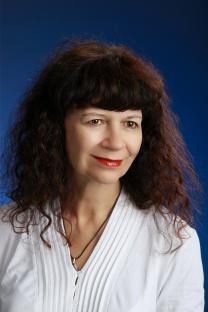MEET OUR SCHOLARS
Humanities / Cultural Studies
Thursday, December 6, 2018
Dr hab. Jolanta Ambrosewicz-Jacobs
Lecturer at the UNESCO Chair for Education about the Holocaust at the Institute of European Studies at the Jagiellonian University
The Kosciuszko Foundation Scholar 2018-2019 Academic Year, during her 4-month research project, to seeks an answer to the question why, so many years after the Holocaust, many countries still have not come to terms with the Holocaust. The study will emphasize the connection between education, social action, and current historical narratives, concepts of collective memory, national identities and historical politics in the USA and in the wider world with Prof. Deena Aranoffn at Graduate Theological Union, Berkeley, CA; Prof. Gabriel Finder at the Jewish Studies Program, University of Virginia, Charlottesville, VA.
* * *

On Thursday, November 29th 2018 Dr. Jolanta Ambrosewicz-Jacobs in cooperation with Dr. Alexis Herr discussed:
"Holocaust Memory in Poland: Attitudes, Studies, Politics and More"
Different historical narratives and collective memories linked to the post-WWII constructions of national identity still divide Western and Central-Eastern Europe. The history of the Holocaust still waits for contextual approaches, particularly when we face abuses of Holocaust memory. In this presentation, Dr. Jolanta Ambrosewicz-Jacobs argues that a "politics of pride" - replacing the former "politics of shame" - is connected to the intergenerational transmission of long-lasting denial of facts in Polish national histories.
This event is co-sponsored by the Jewish Family and Children's Services Holocaust Center.
Dr. Jolanta Ambrosewicz-Jacobs is a scholar of the Kosciuszko Foundation. She teaches at the UNESCO Chair for Education about the Holocaust at the Institute for European Studies at the Jagiellonian University (JU) where between 2008 and 2017, she was the Director of the Center for Holocaust Studies. She was 2011/2012 Ina Levine Invitational Scholar at the United States Holocaust Memorial Museum, a Pew Fellow at the Center for the Study of Human Rights at Columbia University, a visiting fellow at Oxford University and Cambridge University, and was a DAAD fellow at the Memorial and Educational Site House of the Wannsee Conference.
Dr. Jolanta Ambrosewicz-Jacobs is the author of Me – Us – Them. Ethnic Prejudices and Alternative Methods of Education: The Case of Poland (2003); Tolerancja. Jak uczyć siebie i innych [Tolerance. How to Teach Ourselves and Others] (2003, 2004); was the editor of The Holocaust Voices of Scholars, (ed.) (2009) and co-editor of Pamięć. Świadomość. Odpowiedzialność. Remembrance. Awareness, Responsibility (with K. Oleksy), (2008), Why Should We Teach about the Holocaust? (with L. Hońdo) (2005), International Holocaust Remembrance Alliance (Ed.), and Research in Teaching and Learning about the Holocaust: A Dialogue Beyond Borders. Edited by Monique Eckmann, Doyle Stevick and Jolanta Ambrosewicz-Jacobs, IHRA series, vol. 3, Metropol, Berlin 2017.
Dr. Alexis Herr holds a doctorate in Holocaust History from the Strassler Center for Holocaust and Genocide Studies, Clark University. She is the Associate Director of the Jewish Family and Children Services Holocaust Center in San Francisco. Ms. Herr has held teaching positions at Keene State College and Northeastern University. She is the recipient of numerous fellowships and awards including the Saul Kagan Claims Conference Dissertation Fellowship (2012-2014), the Pear Resnick Postdoctoral Fellowship in Advanced Holocaust Studies, United States Holocaust Memorial Museum in Washington, DC (2016), the European Historical Research Infrastructure Fellowship (2017), and the Saul Kagan Claims Conference Postdoctoral Fellowship (2017-2018).
She is the author of The Holocaust and Compensated Compliance in Italy: Fossoli di Carpi, 1942 – 1952 (2016), and the editor of Rwanda: The Essential Reference Guide (2018) and Sudan: The Essential Reference Guide (2019).
Her current book project entitled Perpetrators on the Periphery of Genocide: Italian Police during the Holocaust, examines the role of the Italian police during Fascism (1922-1943) and under German occupation (1943-1945). Scrutinizing the actions of ordinary police, Dr. Herr questions whether geographical and temporal limits play a role in determining whether one's actions make her/him a perpetrator of genocide.
References:
https://www.gtu.edu/events/holocaust-memory-poland-attitudes-studies-politics-and-more



